Previous Semester | Next Semester
Spring 2018 Fellows
A.M. Rosenthal Writer-in-Residence
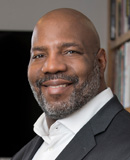 Jelani Cobb is the Ira A. Lipman Professor of Journalism at Columbia University and a staff writer for The New Yorker, where he writes about race, politics, history, and culture. Previously, Cobb was Associate Professor of History and Director of the Africana Studies Institute at the University of Connecticut where he specialized in post-Civil War African American history, 20th century American politics and Cold War history. He is a recipient of fellowships from the Fulbright and Ford Foundations, and winner of the 2015 Sidney Hillman Award for Opinion and Analysis. Cobb is the author of The Substance of Hope: Barack Obama and the Paradox of Progress, To the Break of Dawn: A Freestyle on the Hip Hop Aesthetic, and The Devil and Dave Chappelle and Other Essays. While at the Shorenstein Center, Cobb will write, teach student workshops, and interact with the Harvard community.
Jelani Cobb is the Ira A. Lipman Professor of Journalism at Columbia University and a staff writer for The New Yorker, where he writes about race, politics, history, and culture. Previously, Cobb was Associate Professor of History and Director of the Africana Studies Institute at the University of Connecticut where he specialized in post-Civil War African American history, 20th century American politics and Cold War history. He is a recipient of fellowships from the Fulbright and Ford Foundations, and winner of the 2015 Sidney Hillman Award for Opinion and Analysis. Cobb is the author of The Substance of Hope: Barack Obama and the Paradox of Progress, To the Break of Dawn: A Freestyle on the Hip Hop Aesthetic, and The Devil and Dave Chappelle and Other Essays. While at the Shorenstein Center, Cobb will write, teach student workshops, and interact with the Harvard community.
Joan Shorenstein Fellows
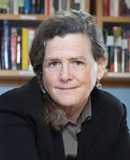 Elizabeth Arnold is a former NPR Political Correspondent, an Associate Professor of Journalism at the University of Alaska, and the producer of arcticprofiles.com. For 20 years she covered Congress, the White House, and the American West on Morning Edition, All Things Considered, and PBS Washington Week. Arnold has received numerous awards, including a duPont Columbia Silver Baton and the Dirksen Award for Distinguished Reporting of Congress. Over the last decade, she has reported on the ecological and human impacts of global warming. While at the Shorenstein Center, Arnold will explore the role of the media in communicating climate change.
Elizabeth Arnold is a former NPR Political Correspondent, an Associate Professor of Journalism at the University of Alaska, and the producer of arcticprofiles.com. For 20 years she covered Congress, the White House, and the American West on Morning Edition, All Things Considered, and PBS Washington Week. Arnold has received numerous awards, including a duPont Columbia Silver Baton and the Dirksen Award for Distinguished Reporting of Congress. Over the last decade, she has reported on the ecological and human impacts of global warming. While at the Shorenstein Center, Arnold will explore the role of the media in communicating climate change.
Paper: Doom and Gloom: The Role of the Media in Public Disengagement on Climate Change
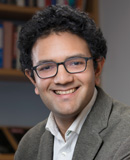 Dipayan Ghosh is a fellow at New America, where he works on digital privacy, artificial intelligence, and civil rights. A computer scientist by training, Ghosh until recently worked on global privacy and public policy issues at Facebook. Prior to Facebook, Ghosh was a technology and economic policy advisor at the White House. He served across the Office of Science & Technology Policy and the National Economic Council, where he worked on issues concerning big data’s impact on consumer privacy and the digital economy. While at the Shorenstein Center, Ghosh will write about algorithmic discrimination, AI, and civil rights.
Dipayan Ghosh is a fellow at New America, where he works on digital privacy, artificial intelligence, and civil rights. A computer scientist by training, Ghosh until recently worked on global privacy and public policy issues at Facebook. Prior to Facebook, Ghosh was a technology and economic policy advisor at the White House. He served across the Office of Science & Technology Policy and the National Economic Council, where he worked on issues concerning big data’s impact on consumer privacy and the digital economy. While at the Shorenstein Center, Ghosh will write about algorithmic discrimination, AI, and civil rights.
 Genevieve Roth is a founding partner of Invisible Hand, a social impact and events agency that focuses on the intersection of media, women’s empowerment, and social justice. Before founding Invisible Hand, Roth was the director of creative engagement for Hillary for America. From 2011 to 2016, she was the executive director of special projects at Glamour, where she was responsible for producing the magazine’s Women of the Year Awards. In 2014, she cofounded and served as director of The Girl Project, Glamour’s global philanthropic initiative that aims to increase girls’ access to education. While at the Shorenstein Center, Roth will focus on the impact of culture on social change.
Genevieve Roth is a founding partner of Invisible Hand, a social impact and events agency that focuses on the intersection of media, women’s empowerment, and social justice. Before founding Invisible Hand, Roth was the director of creative engagement for Hillary for America. From 2011 to 2016, she was the executive director of special projects at Glamour, where she was responsible for producing the magazine’s Women of the Year Awards. In 2014, she cofounded and served as director of The Girl Project, Glamour’s global philanthropic initiative that aims to increase girls’ access to education. While at the Shorenstein Center, Roth will focus on the impact of culture on social change.
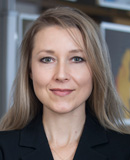 Sarah Smarsh is the author of the forthcoming book Heartland: A Memoir of Working Hard and Being Broke in the Richest Country on Earth (Scribner, September 2018). A freelance journalist and former professor of nonfiction writing, Smarsh covers politics and economic inequality for The Guardian, the Economic Hardship Reporting Project, and others from her home state of Kansas. She contributed to the 2017 book Tales of Two Americas: Stories of Inequality in a Divided Nation and is a frequent speaker on socioeconomic class and related media narratives. While at the Shorenstein Center, Smarsh will develop a podcast exploring the intersection of health and poverty, with a focus on rural experiences.
Sarah Smarsh is the author of the forthcoming book Heartland: A Memoir of Working Hard and Being Broke in the Richest Country on Earth (Scribner, September 2018). A freelance journalist and former professor of nonfiction writing, Smarsh covers politics and economic inequality for The Guardian, the Economic Hardship Reporting Project, and others from her home state of Kansas. She contributed to the 2017 book Tales of Two Americas: Stories of Inequality in a Divided Nation and is a frequent speaker on socioeconomic class and related media narratives. While at the Shorenstein Center, Smarsh will develop a podcast exploring the intersection of health and poverty, with a focus on rural experiences.
Entrepreneurship Fellow
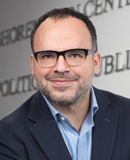 Hossein Derakhshan is an Iranian-Canadian writer and researcher who focuses on the long-term socio-political impacts of media and technology. In the early 2000s he introduced blogging to Iran which earned him the title of “blogfather.” He was imprisoned in Tehran for six years for his writings and online activism. Derakhshan is the author of The Web We Have to Save, a co-author of Information Disorder: Toward an Interdisciplinary Framework for Research and Policymaking, and he has written for The New York Times, The Guardian, Libération, MIT Technology Review, Wired, and other outlets. While at the Shorenstein Center he will focus on alternative futures for online and offline journalism, information disorder, and alternative algorithms.
Hossein Derakhshan is an Iranian-Canadian writer and researcher who focuses on the long-term socio-political impacts of media and technology. In the early 2000s he introduced blogging to Iran which earned him the title of “blogfather.” He was imprisoned in Tehran for six years for his writings and online activism. Derakhshan is the author of The Web We Have to Save, a co-author of Information Disorder: Toward an Interdisciplinary Framework for Research and Policymaking, and he has written for The New York Times, The Guardian, Libération, MIT Technology Review, Wired, and other outlets. While at the Shorenstein Center he will focus on alternative futures for online and offline journalism, information disorder, and alternative algorithms.
Paper: Face It, You Just Don’t Care About the News Anymore
Walter Shorenstein Media and Democracy Fellow
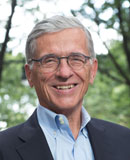 Tom Wheeler, Walter Shorenstein Media and Democracy Fellow for the 2017-18 academic year, served as the Chairman of the FCC from 2013 to 2017 under President Obama. For more than three decades, Wheeler has been involved with new telecommunications networks and services, experiencing the revolution in telecommunications as a policy expert, advocate, and businessman. As an entrepreneur, he started or helped start multiple companies offering cable, wireless, and video communications services. While at the Shorenstein Center, Wheeler will conduct research and teach study groups on the intersection of public policy and transformational technology.
Tom Wheeler, Walter Shorenstein Media and Democracy Fellow for the 2017-18 academic year, served as the Chairman of the FCC from 2013 to 2017 under President Obama. For more than three decades, Wheeler has been involved with new telecommunications networks and services, experiencing the revolution in telecommunications as a policy expert, advocate, and businessman. As an entrepreneur, he started or helped start multiple companies offering cable, wireless, and video communications services. While at the Shorenstein Center, Wheeler will conduct research and teach study groups on the intersection of public policy and transformational technology.
Visiting Fellow
 Kinsey Wilson is a senior advisor to the President and CEO of The New York Times and previously held dual masthead titles as Editor for Innovation and Strategy and Executive Vice President for Product and Technology. Before his work at the Times, he oversaw NPR’s worldwide news gathering, programming and digital operations as EVP and Chief Content Officer. Previously, as Editor-in-Chief of usatoday.com and Executive Editor of USA TODAY, he helped define the standards for online journalism through coverage of major news events including the 2000 presidential election, 9/11, the Iraq War and Hurricane Katrina. Wilson will work with the Center on its new single-subject news project, as well as other initiatives around new and emerging business models for news. He will visit the Center twice per semester.
Kinsey Wilson is a senior advisor to the President and CEO of The New York Times and previously held dual masthead titles as Editor for Innovation and Strategy and Executive Vice President for Product and Technology. Before his work at the Times, he oversaw NPR’s worldwide news gathering, programming and digital operations as EVP and Chief Content Officer. Previously, as Editor-in-Chief of usatoday.com and Executive Editor of USA TODAY, he helped define the standards for online journalism through coverage of major news events including the 2000 presidential election, 9/11, the Iraq War and Hurricane Katrina. Wilson will work with the Center on its new single-subject news project, as well as other initiatives around new and emerging business models for news. He will visit the Center twice per semester.

